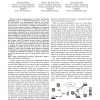Free Online Productivity Tools
i2Speak
i2Symbol
i2OCR
iTex2Img
iWeb2Print
iWeb2Shot
i2Type
iPdf2Split
iPdf2Merge
i2Bopomofo
i2Arabic
i2Style
i2Image
i2PDF
iLatex2Rtf
Sci2ools
104
click to vote
CCGRID
2009
IEEE
2009
IEEE
Multicast Trees for Collaborative Applications
—Current implementations of real-time collaborative applications rely on a dedicated infrastructure to carry out all synchronizing and communication functions, and require all end nodes to communicate directly with and through the central server. In this paper, we investigate an architecture, in which the most resource intensive functionality of continuous communication among collaborators to disseminate changes is decentralized, utilizing the end users as relays. We observe that communication characteristics of real-time collaboration makes use of existing multicast mechanisms unsuitable. As collaborative editing sessions are typically long, we are able to gather and then use additional parameters of nodes (their instabilities and frequency of sending updates) and communication links (latencies and average costs). We identify several criteria to determine the quality of a multicast tree: cost, latency and instability. We analyze the complexity of these problems and propose algorithm...
CCGRID 2009 | Cluster Computing | Communication | Multiobjective Problem | Real-time Collaborative Applications |
Related Content
| Added | 20 May 2010 |
| Updated | 20 May 2010 |
| Type | Conference |
| Year | 2009 |
| Where | CCGRID |
| Authors | Krzysztof Rzadca, Jackson Tan Teck Yong, Anwitaman Datta |
Comments (0)

